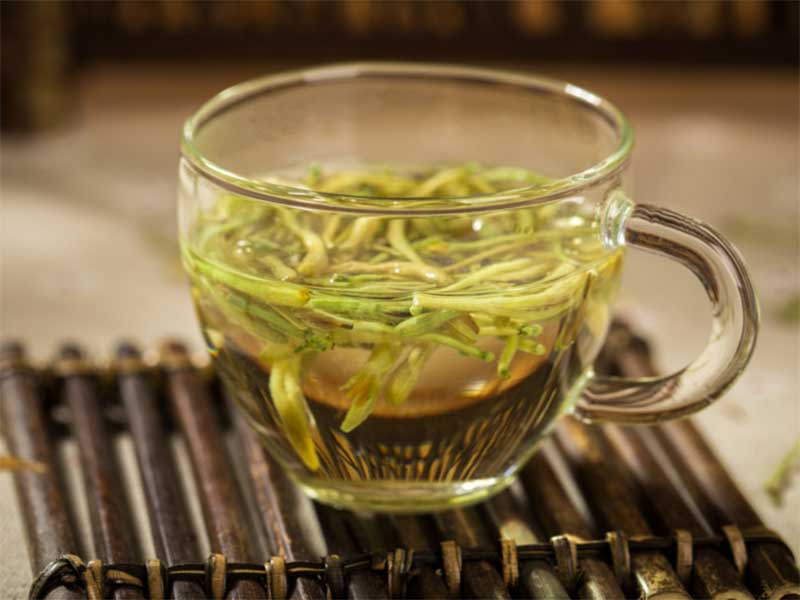Drinking honeysuckle tea is a popular natural remedy for many different ailments, and also makes for a delicious and unique summer drink!
What is Honeysuckle Tea?
Honeysuckle tea is an herbal tea made from the flowers of the honeysuckle plant, which belongs to the Caprifoliaceae family. One of the most common forms is known as Lonicera periclymenum. There are nearly 200 different species of this flower, but many of them share similar nutritional profiles and active ingredients. This flower has been in use for generations, and the tea is extremely simple to make. Thanks to the high concentration of quercetin, rutin, calcium, potassium, manganese, and other antioxidants, this floral tea can be a wonderful addition to your health. [1]
How to Make Honeysuckle Tea?
If you want to brew your honeysuckle tea at home, it couldn’t be simpler. This drink is usually prepared warm but then served cold, as a refreshing drink. Take a look at the recipe below.
Healing Honeysuckle Tea Recipe
Heal your body and mind with this soothing and aromatic tea!
Ingredients:
- 4 cups of water (filtered)
- 2 cups of fresh honeysuckle flowers
- 1 tsp of honey
Instructions:
-
To make honeysuckle tea, collect open honeysuckle flowers, plucking them at the base, so the nectar is retained.
-
Place a handful of flowers in a large mason jar.
-
Bring 4 cups of water to a boil, then remove from heat and wait for 2 minutes.
-
Pour the hot water over the flowers in the jar.
-
Allow the mixture to cool down to room temperature as it steeps.
-
Serve over ice cubes and store the remaining tea in the refrigerator.
Honeysuckle Tea Benefits
The most impressive benefits of honeysuckle tea include the following:
- Preventing infections
- Improving digestion
- Regulating blood sugar levels
- Reducing inflammation
- Treating cold and flu
Some of the active ingredients in these flowers have shown a remarkable ability [2] to fight off the bacteria and viruses that can cause the common cold and the flu. Let us look at the benefits in detail:
Allergies
By improving the efficiency of the immune system, drinking this floral tea can help to prevent unnecessary immune responses from the body, and reduce the severity of allergic reactions.
Detoxify the Body
One of the unusual effects of this tea is that it makes you sweat – an excellent way for the body to rapidly eliminate toxins that have been building up. [3]
Inflammation
When consumed regularly, this tea is believed to be able to lessen the symptoms of arthritis and other chronic inflammatory conditions. [4]
Blood Sugar
Studies have found that this tea can help regulate the levels of blood sugar and insulin in the body, which is very good news for diabetic patients. [5]
Headaches
Sipping on a cup of honeysuckle tea has been the recommended remedy for headaches for generations, thanks to the anti-inflammatory compounds it contains. [6]
Honeysuckle Tea Side Effects
Aside from the many health benefits, there are some side effects when taken in excess, and can be dangerous for women who are pregnant or nursing.
- Generally speaking, pregnant women are recommended to avoid this tea, as there is only a limited amount of research on its effects.
- It can also be a blood thinner, so people on blood-thinning medication or those planning on undergoing surgery should speak with their doctor before using this tea.
References:
- https://www.sciencedirect.com/science/article/pii/S0889157514000088
- https://books.google.com/books?hl=en&lr=&id=6jRsF1nOmqgC&oi=fnd&pg=PR6&dq=%22honeysuckle+tea%22+immune&ots=S-BlnO0WI6&sig=Nm0IjwJ217LHbCzby4Pt66pRCuQ#v=onepage&q=%22honeysuckle%20tea%22%20immune&f=false
- http://en.cnki.com.cn/Article_en/CJFDTOTAL-AHNY200815148.htm
- https://www.sciencedirect.com/science/article/pii/S0014483505003398
- http://pubs.acs.org/doi/abs/10.1021/jf030509o
- http://en.cnki.com.cn/Article_en/CJFDTOTAL-SYZY201209047.htm
Important Notice: This article was originally published at www.organicfacts.net by John Staughton (BASc, BFA) where all credits are due.









